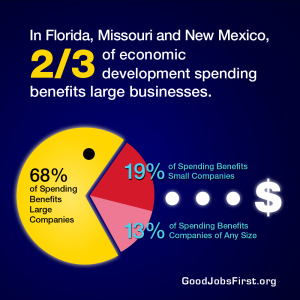Washington, DC—Amidst a political season thick with pro-small business rhetoric, a new study on what states actually spend to help create private-sector jobs reveals a sharp bias against the “entrepreneurial economy.”
In a detailed analysis of three diverse states—Florida, Missouri and New Mexico— the new research finds that at least two-thirds of their economic development spending primarily benefits large businesses. Less than a fifth clearly benefits small businesses, and about an eighth cannot be assigned either way. In total, the study looks at $344 million spent annually through more than 60 programs.
Those are the primary findings of Slicing the Budget Pie for Big Business, released today by Good Jobs First at:www.goodjobsfirst.org/slicingthebudget . It was funded by the Ewing Marion Kauffman Foundation. All findings and policy conclusions are solely those of Good Jobs First.
“There’s a galling mismatch between how governors and other state officials characterize their support for small businesses and what they actually spend,” said Greg LeRoy, executive director of Good Jobs First. “We applaud some candidates for federal office who have raised the issue of a federal spending bias against small business; states have the same problem.”
The new study confirms findings Good Jobs First published from 14 states last fall. In Shortchanging Small Business, Good Jobs First examined more than 4,200 individual subsidy awards and found 90 percent of dollars and 70 percent awards going to big businesses—even though the programs examined were open to companies of any size.
The new study is based upon a detailed review of many dozens of state economic development programs and their eligibility and targeting rules, state budgets and tax expenditure reports, and entries in Good Jobs First’s Subsidy Tracker database. In some cases, large samples of program award lists had to be examined to determine the sizes of companies benefiting.
“The bias in favor of big business is compelling evidence that economic development spending has strayed far from its original mission of correcting market failures,” said LeRoy. “An incentive is supposedly intended to enable something that should happen but won’t happen until public dollars reduce private risk. But it’s hard to see how tax breaks are really influencing companies with access to credit, well-established markets and deep pools of management talent. Instead, those resources really could help smaller firms still struggling with a credit crunch lingering from the Great Recession.”
The report recommends that states publish their own annual reports on how much spending goes to small firms, lauding Missouri for already doing so. Good Jobs First also again calls on states to spend less on big businesses by rewriting program rules in four specific ways.
In a related report also released last fall, In Search of A Level Playing Field, Good Jobs First interviewed 40 leaders of small business groups with 25,000 member firms. By super-majorities, they criticized state economic development programs as ill-suited for small and growing businesses. Many also recommended a shift in spending priorities towards public investments that benefit all employers.
Good Jobs First is a non-profit, non-partisan resource center promoting accountability in economic development. Founded in 1998, it is based in Washington DC.


